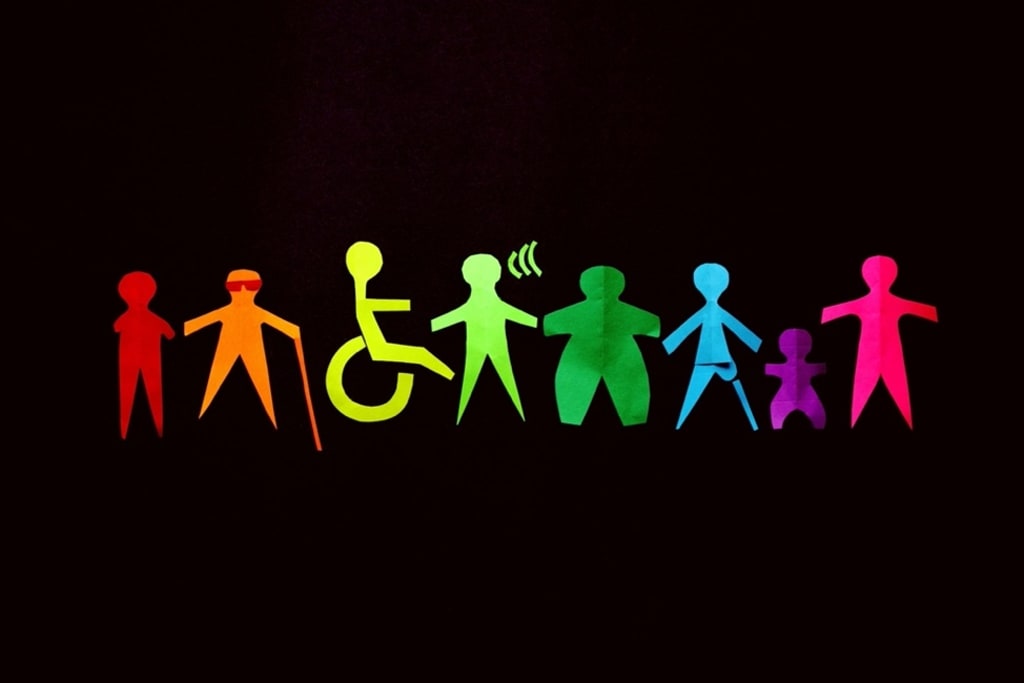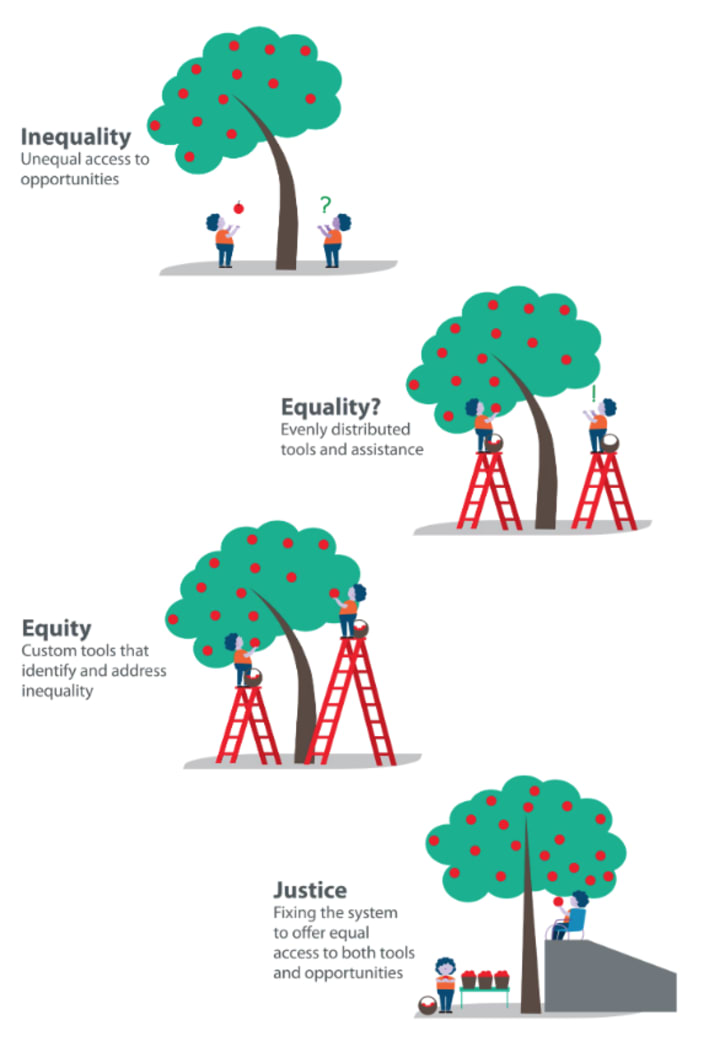The Specious Reason Behind the Lack of Diversity, Equity, and Inclusion Training in the Workplace
A "Living Rare" Editorial

In just the last few years, there’s been an increasing amount of attention drawn to Diversity, Equity, and Inclusion (DEI) initiatives in workplaces and communities – or, more specifically, the lack of those initiatives.
Some of the most well-known examples include such corporations and organizations as Starbucks, Sephora, and even the City of Seattle. Much of this was exacerbated by the emergence of a global pandemic, forcing many to rethink work environments and completely audit their business models.
However, there’s still an ever-growing need for DEI training in the workplace, in nonprofit organizations, and even in communities. Some leaders have neglected to implement DEI initiatives, largely due to a failure to prioritize those measures for a variety of reasons. Let’s explore why that is, why DEI initiatives are so important, how this impacts the rare disease community, and how those in leadership roles can make a difference.
The Importance of Diversity, Equity, and Inclusion (DEI) Training
Before getting into the reasons for the lack of DEI training, we must first understand what this training is, why it’s important, and how it relates to those in the rare disease community.
Diversity, equity, and inclusion (DEI) initiatives focus on creating a safe, diverse, and equitable environment for the members of individual groups that have been historically marginalized by society's dominant status quo. Diverse inclusion involves intentionally cultivating a team or group that is representative of a variety of different individual traits, cultures, perspectives and characteristics such as, but not limited to:
- Racial classification
- Native culture
- Ethnicity
- Socioeconomic background and current status
- Gender identity
- Nation of origin and residence
- Political preferences and perspectives
- Religious beliefs
- Physical Differences, abilities, and disabilities
Equity involves essentially leveling the playing field for every individual involved. It’s important to distinguish this from the concept of equality – equality involves providing the same exact set of resources for everyone, which doesn’t account for the unique needs of individuals that do not fit into the underlying norms or standards that influenced the creation of those resources. Equity, however, involves providing a variety of resources and accommodations to suit each unique person, which ensures that everyone has equal access to opportunities.

Finally, inclusion is about making sure that everyone’s unique variations consciously influence decision-making and/or designated activities. Understanding the differences observed across natural human variations is absolutely vital to establishing a comprehensive perspective and cohesive, sustainable environments.
Common areas of focus that are taken into account through community-based DEI training programs include addressing biases (both unconscious & implicit), stereotyping & prejudices, cultural consciousness & awareness, accountability & humility, inclusive leadership, microaggressions, anticipating accommodation requirements & requests, and appropriate community engagement.
Businesses and organizations with strong DEI training programs and policies reap significant results, including:
- Improved team & employee performance
- Increased revenue
- Novel & creative innovations
- Increased employee and/or community engagement
- Development of a comprehensive perspective
- Safer & more efficient work environments
- Increased employee learning & performance outcomes
- Happier, healthier team members
- Reduced conflict among employees and/or group members
- More effective leadership teams
Sincere DEI initiatives also place a strong emphasis on the creation of belonging among all existing and new members of a team. To measure this, the Center for Talent Innovation (CTI) first made a 24-item scale which they then boiled down to four main categories:
- Feeling seen – this involves feeling recognized, rewarded, and respected within your team, as well as feeling that you can speak your mind from a unique perspective without fear of retaliation, disrespectful responses, or being disregarded.
- Feeling connected – feeling connected to your team through genuine social relations and interactions without feeling that you’re being seen as an “other” by your peers/colleagues.
- Feeling supported – this involves being supplied with the appropriate tools, resources, and accommodations to ensure success and accessibility.
- Feeling proud – this is when you feel proud of your business or organization because its values, goals, and actions are aligned with your own.
As summarized by the CTI in a 2020 report, belonging means “you feel seen for your unique contributions; connected to your coworkers; supported in your daily work and career development; and proud of your organization’s values and purpose.”
DEI initiatives and measures of belonging tend to be closely linked, especially for those in historically marginalized groups within the workplace. Those with lower belonging scores are shown to be far less engaged in, and loyal to, their group/employer. For most people of color, when a traditional working group or team has failed to practice conscious inclusion, the sense of belonging to the group or team is often lost or significantly limited, especially when compared to people who racially classify as white.
A majority of the global rare disease community inherently belongs to at least one historically disenfranchised and/or marginalized group of people, making community-based DEI initiatives all the more important for professional stakeholders who work in the rare disease biotechnology industry.
Reasons Behind the Lack of DEI Training
A 2020 survey and report from the Center for Talent Innovation closely examined the attitudes of a “majority of men” in corporate leadership roles toward DEI initiatives. The survey results offer valuable insight into the reasons and barriers that have prevented these corporations from implementing sincere, successful and impactful DEI initiatives.
The “majority of men” that participated in the survey were mostly straight cisgender (meaning their gender identity is the same as their biological sex assigned at birth) white males (95% of survey participants). The remaining 5% of survey participants included non-white straight cisgender males that are representative of a minority group when compared with other male groups in the US, but a majority group within their group or workplace.
White males hold 72% of leadership roles across a variety of corporate industries, making it imperative that they understand the benefits of meaningful, real-world DEI initiatives. More importantly, society needs this group of people to use their influence to take action by implementing sincere DEI training and sustainable long-term policies that correct for historical siloes and bottlenecks.
The results of the survey divided the participants up into three groups based on their attitude toward DEI initiatives:
- Detractors - these participants believe that DEI is not at all important (10%)
- Persuadables - these participants believe DEI to be “not very/somewhat important” (48%)
- True Believers - these participants believe DEI to be “very/extremely important” (42%)
Most of those that fell into the Detractor category stated that they felt DEI initiatives offered no benefit for them. Those in the Persuadable category mostly had mixed feelings about DEI initiatives – they believe DEI initiatives are beneficial, but come at the expense of others (whether that be due to the costs to train employees and set aside time for that training, the need to hire more employees to diversify their company, or any other specific issues).
While it can be disconcerting to see that 10% of the participants didn’t find DEI to be important, it’s quite hopeful to see that the majority of the participants either highly valued DEI or are in the position to be persuaded to find it more important.
The main reason that the participants of this study cited for neglecting to implement DEI initiatives was a lack of time.
“I don’t want to perpetuate bias, but I’m focused more on accomplishing what is asked of me and my team to achieve,” stated one participant.
“The ability to just get regular work done is so hard that there’s rarely interest or time to work on the ‘higher order’ tasks that promote a healthy culture,” said another.
While this seems like a relatively understandable and benign reason – especially considering the productivity and time management-centered values of modern life – it also signals a deeper issue: a failure to prioritize the workplace/group environment and the valuable individuals that contribute to the group’s success. DEI initiatives are still seen more like an extracurricular activity than an essential piece of the business model.
Fortunately, the report assures us that it’s possible to sway the majority of men by showing them the value of implementing DEI training and policies – not just the benefits for their employees/group members, but also for themselves and their company/organization. Creating an inclusive environment boosts business performance and profits while drastically increasing a sense of belonging among colleagues.
Even more hopeful is that the data trends found in this report indicate that current and future leaders are more likely to fall into the True Believer category.
How to Make a Difference
There’s no single person, action, or policy that can fix the current DEI issues. Nonetheless, the adoption of DEI initiatives is a social effort that we all can advocate for the implementation of across the board.
We may not be able to sway the 10% of detractors, but the other 90% of Persuadables and True Believers can be convinced to prioritize DEI and meaningful take action.
If you’re in a leadership role within a business or organization, here are some ways that you can bring DEI to your workplace or group:
- Make the effort to understand any existing barriers that may be hindering your team/employees' ability to perform. Make a safe space to discuss accessibility issues and potential accommodations. Make sure your team knows that you are open to ideas on how to make the workspace more equitable (within reason, of course).
- Allocate funds to conduct an accessibility audit of your company/services/products by consulting with community-based disability experts.
- Examine your workplace and identify the homogenous groups and tokenized individuals. Connect with decision-makers and suggest the on-boarding of an external DEI expert consultant that has a community-based specialization within the company’s overall target market. With the DEI expert consultant, sustainable, trust-building DEI initiatives and actionable steps can finally begin to be mapped out for the business/organization, without subjecting the DEI expert to historical pressures to identify initiatives that maintain and “protect” the existing siloed infrastructure.
- Take an unLearning course. Embrace serious self-reflection aimed at identifying ways your own implicit or unconscious biases have impacted your leadership and decision-making. Examining ourselves in that manner can be very uncomfortable – after all, most of us prefer to avoid acts of accountability, especially when our actions are rooted in biases – but in order to successfully evolve with society, one must recognize change and consciously work toward identifying the impact of our own biases on our decision-making capabilities.
- Publish your formalized DEI plan of action publicly. This lets the people of the community know that your company/organization is consciously willing and open to being held accountable for enforcing your DEI initiative.
- Contract a community-based DEI agency as a long-term commitment. One-time training is shown to be less effective in the long run. Plus, as time goes on, new information and advances allow teams to continue growing, improving, and integrating appropriate DEI initiatives.
- Never ask community-based DEI experts to work for free. Always provide pay incentives to show that your company/organization truly values those in leadership DEI roles.
- Promote actionable allyship and collaboration milestones, especially amongst the majority male groups. As stated in the aforementioned CTI report, “The vision of belonging for all is no mirage—it is an achievable reality. But to emerge from this unique moment in history with collaboration, communication, and community, rather than a greater sense of turmoil and division, majority men need to be included.”
If you’re part of the rare disease community and feel that a group or employer is neglecting to implement meaningful DEI initiatives, it is important to advocate for yourself and for your needs. Ask your leaders or managers for a private sit down and have a sincere conversation about the importance of actionable DEI programs. When you point out exactly what you feel is missing or what needs are not being addressed to allow for a healthy, productive work environment, be sure to include suggestions on some possible steps that can be taken to make a positive change.
With the right amount of majority men, leaders, and members of marginalized communities banding together, in unity and collaboration, we can turn DEI initiatives into a fundamental building block of businesses, organizations and overall social constructs. Together, we can change workplace environments for the better!
*Note: I originally wrote and published this article as a Living Rare editorial and has been shared here with permission from the Living Rare editorial board. To view the original article or read more Living Rare editorials, click here.
References and Resources
8 types of diversity and inclusion training to implement within your company. InStride. (2022, May 23). Retrieved from https://www.instride.com/insights/diversity-inclusion-training/
Diversity and inclusion (DEI) training in the workplace: Examples. Valamis. (2022). Retrieved from https://www.valamis.com/hub/diversity-training
Diversity, equity, and inclusion for rare disease - rare-X. RARE. (2022, April 5).
Kennedy, J. T., Jain-Link, P., Fabian, I., Fayzar, P., Gawlak, E., Idehen, D., Marte, S., Schenone, L., Stalsburg, B., Steele, F., & Yu, E. (2020, August). What Majority Men Really Think About D&I. Center for Talent Innovation. Retrieved from https://www.talentinnovation.org/_private/MajorityMenBelonging_Report2-Aug2020-CTI.pdf
National Organization for Rare Disorders. (2022). Diversity, Equity and Inclusion (DEI) Toolkit for Rare Disease Patient Organizations - Part 1: Navigating DEI in Rare Disease Nonprofits. NORD. Retrieved from: https://rarediseases.org/wp-content/uploads/2022/03/NORD_2022_DEI-Toolkit_Part1.pdf
National Organization for Rare Disorders. (2022). Diversity, Equity and Inclusion (DEI) Toolkit for Rare Disease Patient Organizations - Part 2: Membership Inclusivity: Who's Left Out? Recognizing Barriers and Building an Inclusive Community. NORD. Retrieved from https://rarediseases.org/wp-content/uploads/2022/03/NORD_2022_DEI-Toolkit_Part2.pdf
Stenger, M. (2022, June 5). Benefits of DEI training in the Workplace. Berlitz. Retrieved from https://www.berlitz.com/blog/benefits-of-dei-training-in-the-workplace
Reviewed and Approved by the OLM DEI Content Review Board.
About the Creator
Aston Martinez
I'm a mom of three that has a burning passion for writing and activism. I'm currently a copywriter for Habit Nest, but I'm on Vocal to branch out further and put more of my own personal work out there. I hope you enjoy them!






Comments
There are no comments for this story
Be the first to respond and start the conversation.